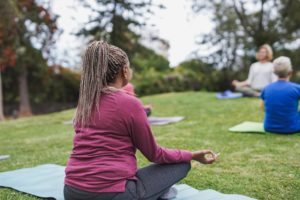
If you’ve been feeling extra stressed lately, you’re not alone. Multiple studies—including Gallup’s State of the Global Workplace: 2022 Report—show that U.S. workers are some of the most stressed out employees in the world. According to the report, globally workers’ stress levels are at an all time high— with working women in Canada and the U.S. among the most stressed workers in the world.
According to the March 2022 Stress in AmericaTM survey conducted by the American Psychological Association, stress among Americans about money and the economy is on the rise. 65% of respondents reported that concerns about money and the economy were a significant source of stress as of February 2022. Among other stressors, 81% of survey respondents reported that global uncertainty is a significant source of stress.
National Relaxation Day, celebrated annually on August 15, is an important reminder that we need to take an active approach to reduce stress.
But first, in order to better understand how to reduce stress, we must understand the role it plays in our lives and how it affects the body and brain…
So then, what is stress?
Stress is defined as an innate response encompassing the body’s physical, mental and emotional reactions to external stressors. Stress can be both positive (eustress) or negative (distress).
While stress is a totally natural part of everyday life, too much stress and/or chronic stress (long-term, elevated stress levels) can lead to behavioral, physical and emotional symptoms.
Physical symptoms of chronic stress can include:
- Aches & pains
- Increased risk of coronary heart disease and stroke (Nature Reviews Cardiology, 2018)
- Chest pain
- Headaches, dizziness or shaking
- High blood pressure
- Muscle tension
- Jaw clenching
- Digestive problems
- Weakened immune system
- Sexual dysfunction
- Sleep issues (such as too much or too little sleep)
- Anxiety
- Irritability
- Depression
- Panic Attacks
- Sadness
- Low self-esteem
- Feeling overwhelmed
- Avoidant behaviors
- Problems with memory or concentration

Benefits of Implementing Relaxation & Stress Reduction Techniques into Everyday Life
Chronic stress can wreak havoc on our brains and bodies, which is why it’s so important to take an active approach in implementing healthy stress relieving techniques and activities into our daily routines.
According to the U.S. Department of Health & Human Services, benefits of regulating stress levels through proactive stress management include:
- Better sleep
- Lower muscle tension
- Weight management benefits
- Improved mood
- Better interpersonal relationships
As stated on The University of North Carolina of Chapel Hill’s Campus Health website,
“Fortunately, there is much that can be done to keep stress and anxiety at a manageable level. Keeping a healthy ‘baseline’ is a cornerstone to managing stress and anxiety. Consistent sleep, regular exercise, good nutrition, healthy relationships and regular periods of relaxation and fun are vital components as well.”

Meditation & Breathing Exercises
Meditation is the practice of training your mind to focus and redirect your thoughts and attention in order to achieve a calm, relaxed and emotionally stable state. Scientific research boasts many benefits of meditation, including stress reduction, lessened anxiety levels, increased emotional wellbeing, self-awareness, increasing attention span, improvement in sleep, decreased blood pressure and more.
Meditation is also one of the most accessible forms of relaxation, since it can be done anytime, from anywhere.
Youtube or apps such as Calm or Headspace are great go-tos for guided meditations. Here’s a favorite five-minute meditation exercise from Youtube.
Breathing exercises, also known as “deep breathing,” have a multitude of health benefits, including promoting relaxation, decreasing stress and helping with depression and anxiety.
Verywell Mind explains how breathing helps us to function more optimally:
“Slow breathing activates the parasympathetic nervous system, also called the ‘rest and digest’ system. Its job is to conserve energy to be used for bodily processes such as digestion and urination. Deep breathing also activates the vagus nerve, which is like the boss of the parasympathetic nervous system, overseeing things like mood, digestion, and heart rate. It will also send more oxygen to your brain and other organs.”
For more information on the science behind breathing exercises—and easy breathing exercises you can do at home—check out this article.
The Valera Health app—available in the Apple App Store and on Google Play—also contains plenty of great mental health content written by mental health experts to help you live your best life.

Spending time outside in nature is linked to both cognitive benefits and improvements in mood, mental health and emotional wellbeing—regardless of how much time is spent in the great outdoors.
A 2019 review by University of Chicago psychologist Marc Berman, PhD, and his student Kathryn Schertz, revealed that green spaces near schools promote cognitive development in children and green views near children’s homes promote self-control behaviors. Similar results occurred when they studied adults assigned to public housing units with more green spaces nearby vs. those without. Those with more green spaces nearby reportedly showed better attentional functioning. Other experiments have shown that being exposed to nature improves working memory, cognitive flexibility and attentional control.
No worries if you don’t have a forest in your backyard—urban parks, trees and other greenery filled spaces have similar benefits. Meaning that a midday stroll around your neighborhood or a nearby park can be equally as mood boosting as spending time in a nature reserve.

Valera Health provides telemental healthcare services including therapy and psychiatry for those ages 6+, as well as in-app mental healthcare content created by our team of mental health experts (available for all Valera Health patients). Our mental health services are comprehensive, inclusive and tailored for you. We accept a large network of insurances as well as Medicare/Medicaid. To learn more, schedule your free consultation with a dedicated Health Connector or visit valerahealth.com.